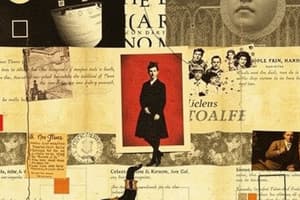Podcast
Questions and Answers
¿Cuál es la obra de Isabel de Villena que se menciona por sus temas feministas y su perspectiva única sobre la vida de Cristo?
¿Cuál es la obra de Isabel de Villena que se menciona por sus temas feministas y su perspectiva única sobre la vida de Cristo?
- The Fabric of Marian Devotion
- La corónica
- Vita Christi (correct)
- A Companion to Spanish Women's Studies
¿Quién es el escritor proto-feminista al que se ha comparado el trabajo de Isabel de Villena?
¿Quién es el escritor proto-feminista al que se ha comparado el trabajo de Isabel de Villena?
- Montserrat Piera
- Lesley K. Twomey
- Albert G. Hauf
- Christine de Pizan (correct)
¿Por qué era importante la escritura para las mujeres en la época de Isabel de Villena?
¿Por qué era importante la escritura para las mujeres en la época de Isabel de Villena?
- Para ganar dinero y estatus
- Para romper el silencio impuesto por los hombres (correct)
- Para promover la iglesia
- Para ganar fama y reconocimiento
¿Cuál era la profesión de la madre de Sor Isabel de Villena?
¿Cuál era la profesión de la madre de Sor Isabel de Villena?
¿Cuál es el título de la publicación de Rosanna Cantavella en la que se encuentra una obra sobre Isabel de Villena?
¿Cuál es el título de la publicación de Rosanna Cantavella en la que se encuentra una obra sobre Isabel de Villena?
¿Cuál fue el título de la obra más famosa de Sor Isabel de Villena?
¿Cuál fue el título de la obra más famosa de Sor Isabel de Villena?
¿Cuál es el idioma en el que se encuentra escrita la obra de Albert G. Hauf sobre Isabel de Villena?
¿Cuál es el idioma en el que se encuentra escrita la obra de Albert G. Hauf sobre Isabel de Villena?
¿Quién fue el benefactor principal del convento de La Trinitat?
¿Quién fue el benefactor principal del convento de La Trinitat?
¿Cuál fue la razón por la que Sor Isabel de Villena no era elegible para ser abadesa?
¿Cuál fue la razón por la que Sor Isabel de Villena no era elegible para ser abadesa?
¿Cuál fue el año en que se cree que Sor Isabel de Villena murió?
¿Cuál fue el año en que se cree que Sor Isabel de Villena murió?
Flashcards are hidden until you start studying
Study Notes
Sor Isabel de Villena: Biography of a Female Writer
Early Life and Education
Sor Isabel de Villena, born Elionor de Villena around 1430, was the illegitimate child of Enrique de Villena and an unknown noblewoman. She was raised by Queen Maria of Castile of Valencia from the age of four. Educated at the court of Alfonso V of Aragon (the Magnanimous), she became a nun in the monastery of La Trinitat at the age of fifteen. This convent, founded by Queen Maria de Luna, was also the chief benefactor.
Career as an Abbess and Writer
In 1462, Isabel became the abbess of the convent and took charge in 1463. There was a rumor that there had to be divine intervention from the Archangel Michael that allowed Isabel to be elected as abbess, as illegitimate children were not usually eligible for such positions.
Isabel dedicated her entire life to the convent and to her writing. Her most famous work is her Vita Christi (Christ's Life), which was widely considered to be a response to the misogynistic book Spill o Llibre de les dones (The Mirror or Book of Women) by Vita Christi.
As a writer, Isabel was a proto-feminist who tried to change the negative image of women at the time through her writing. Her work has been rediscovered and studied more due to the increase in feminist studies.
Death and Legacy
It is believed that Isabel died during an outbreak of plague in 1490 at the age of 60. Her work, including Vita Christi, continues to be studied and appreciated for its feminist themes and its unique perspective on the life of Christ.
Influences and Comparisons
Isabel's work has been compared to that of another proto-feminist writer of the early modern period, Christine de Pizan. Scholars have noted that writing was a way for women to break the silence imposed upon them by men, even though it was discouraged greatly.
Works Cited
- Barnett, David. "The Voice of the Virgin: Accessible Authority in the Visitation Episode of Isabel De Villena's Vita Christi." La corónica 35.1 (2006): 23-45.
- Cantavella, Rosanna. "Intellectual, Contemplative, Administrator: Isabel De Villena and the Vindication of Women." A Companion to Spanish Women's Studies. By Xon De. Ros and Geraldine Hazbun. Woodbridge, Suffolk, UK: Tamesis, 2011. 97-107.
- Hauf, Albert G. D'Eiximenis a sor Isabel De Villena. Barcelona / València. IIFV / PAM. 1990. S. 323-397. (in Catalan)
- Piera, Montserrat. "Writing, Auctoritas and Canon Formation in Sor Isabel De Villena's Vita Christi." La corónica 32.1 (2003): 105-18.
- Twomey, Lesley K. "Sor Isabel De Villena, Her Vita Christi and an Example of Gendered Immaculist Writing in the Fifteenth Century." La corónica 32.1 (2003): 89-103.
- Twomey, Lesley K. The Fabric of Marian Devotion in Isabel De Villena's Vita Christi. Woodbridge, Suffolk: Tamesis, 2013.
Studying That Suits You
Use AI to generate personalized quizzes and flashcards to suit your learning preferences.





